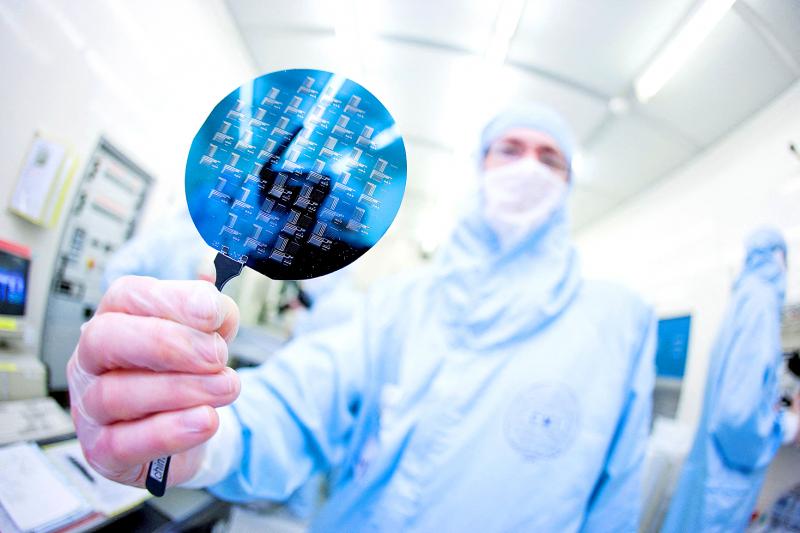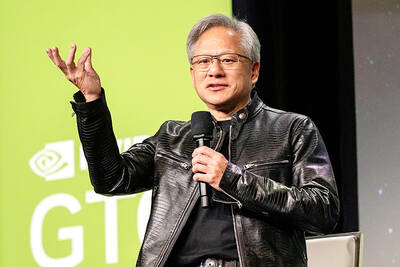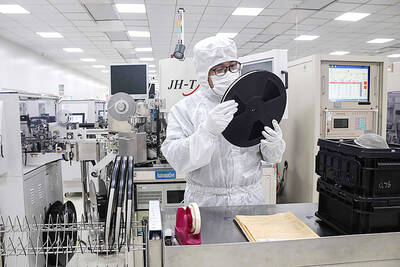Silicon wafer supplier Formosa Sumco Technology Corp (台勝科) yesterday gave an upbeat outlook for the current quarter, as it expects that deteriorating supply constraints would continue to drive up wafer prices, which would help it defy a slowdown in consumer electronics demand.
The company said chip demand is strongly underpinned by exuberant demand from 5G-related devices, automotive electronics and power management chips, which most semiconductor companies consider long-term growth engines.
Customers’ silicon wafer inventories are running low due to prolonged supply-demand imbalances over the past few quarters, the company said in a presentation at an investors’ conference.

Photo: Reuters
“Tight supply of 12-inch silicon wafers for logic and memory chips aggravated during the second quarter. The company is unable to allocate any wafers for customers who did not ink long-term supply contracts,” Formosa Sumco said. “We are also unable to catch up with customers’ demand for 8-inch wafers.”
Formosa Sumco expects supply constraints to extend at least into this quarter, leading to further price increases on the spot market, the company said.
Formosa Sumco, which was founded by Japan-based Komatsu Ltd and Taiwan’s Formosa Plastics Group (FPG, 台塑集團) in 1995, said wafer demand exceeded supply last quarter, which drove up 8-inch and 12-inch wafer spot prices.
The company signed more long-term supply agreements with customers last quarter, extending the coverage to most of its silicon wafers, it said, adding that the contract prices have picked up during the first three months of this year.
Formosa Sumco budgeted NT$18.9 billion (US$643.1 million) for capital spending this year, far exceeding last year’s investment of NT$1.4 billion, as it is seeking to set up a new 12-inch fab in Yunlin County’s Mailiao Township (麥寮) that would cost NT$28.26 billion.
The company aims to ramp up output, with the new factory scheduled to start production in 2024.
The new investment also reflects Formosa Sumco’s bullish view about the silicon wafer market for the coming years.
The company yesterday said that the silicon wafers scarcity would likely persist, given robust market demand and decreases in customers’ wafer inventories.
Global supply of 12-inch silicon wafers would be 3 percent below market demand this year, it said, adding that the supply gap might widen to about 10 percent next year.
Geopolitical tensions, as well as COVID-19-induced supply chain disruptions and lockdowns in China, have affected consumer electronics demand, the company said, but added that this would not dampen customers’ demand for silicon wafers, as they are adjusting product portfolios to cope with the weaker consumer market.
Formosa Sumco shares rose 2.32 percent to NT$265 yesterday, outperforming rival GlobalWafers Inc (環球晶圓), whose stock price rose 0.64 percent to NT$626.
The TAIEX slid 0.73 percent.

‘DECENT RESULTS’: The company said it is confident thanks to an improving world economy and uptakes in new wireless and AI technologies, despite US uncertainty Pegatron Corp (和碩) yesterday said it plans to build a new server manufacturing factory in the US this year to address US President Donald Trump’s new tariff policy. That would be the second server production base for Pegatron in addition to the existing facilities in Taoyuan, the iPhone assembler said. Servers are one of the new businesses Pegatron has explored in recent years to develop a more balanced product lineup. “We aim to provide our services from a location in the vicinity of our customers,” Pegatron president and chief executive officer Gary Cheng (鄭光治) told an online earnings conference yesterday. “We

It was late morning and steam was rising from water tanks atop the colorful, but opaque-windowed, “soapland” sex parlors in a historic Tokyo red-light district. Walking through the narrow streets, camera in hand, was Beniko — a former sex worker who is trying to capture the spirit of the area once known as Yoshiwara through photography. “People often talk about this neighborhood having a ‘bad history,’” said Beniko, who goes by her nickname. “But the truth is that through the years people have lived here, made a life here, sometimes struggled to survive. I want to share that reality.” In its mid-17th to

‘MAKE OR BREAK’: Nvidia shares remain down more than 9 percent, but investors are hoping CEO Jensen Huang’s speech can stave off fears that the sales boom is peaking Shares in Nvidia Corp’s Taiwanese suppliers mostly closed higher yesterday on hopes that the US artificial intelligence (AI) chip designer would showcase next-generation technologies at its annual AI conference slated to open later in the day. The GPU Technology Conference (GTC) in California is to feature developers, engineers, researchers, inventors and information technology professionals, and would focus on AI, computer graphics, data science, machine learning and autonomous machines. The event comes at a make-or-break moment for the firm, as it heads into the next few quarters, with Nvidia CEO Jensen Huang’s (黃仁勳) keynote speech today seen as having the ability to

The battle for artificial intelligence supremacy hinges on microchips, but the semiconductor sector that produces them has a dirty secret: It is a major source of chemicals linked to cancer and other health problems. Global chip sales surged more than 19 percent to about US$628 billion last year, according to the Semiconductor Industry Association, which forecasts double-digit growth again this year. That is adding urgency to reducing the effects of “forever chemicals” — which are also used to make firefighting foam, nonstick pans, raincoats and other everyday items — as are regulators in the US and Europe who are beginning to